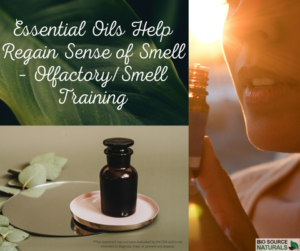Using Essential Oils for Olfactory Training- Smell Training
Using Essential Oils for Olfactory Training- Smell Training
 Loss of smell is relatively common with respiratory viruses because of congestion and nasal inflammation. For people who contracted COVID-19, many have been unable to regain their sense of smell. Using essential oils for olfactory training may help regain the lost sense of smell through olfactory or smell training.
Loss of smell is relatively common with respiratory viruses because of congestion and nasal inflammation. For people who contracted COVID-19, many have been unable to regain their sense of smell. Using essential oils for olfactory training may help regain the lost sense of smell through olfactory or smell training.
Olfactory/Smell Training
We would like to discuss in this blog using essential oils for olfactory training or smell training, a commonplace healing process that helps to regain a persons sense of smell. This process is the act of regularly sniffing or exposing oneself to robust aromas with the intention of regaining a sense of smell. The average time of olfactory dysfunction reported by COVID-19 patients was 21.6 days, according to the study in the Journal of Internal Medicine. Nearly a quarter of the 2,581 COVID-19 patients studied didn’t regain smell and taste within 60 days of infection. The loss of smell for COVID-19 patients may be due to damage to the olfactory neurons, which results in scrambled messages being sent from smell receptors in the nose to the brain. Some patients experience a complete loss of smell (known as anosmia), while others may only have a partial loss of smell (or hyposmia).
The natural plant extracts in essential oils make them an excellent tool for olfactory training. Their stimulating and potent aromas tend to have a single dominant scent, where perfumes contain different scent combinations. The essential oils that have been studied to treat the loss of smell are rose, eucalyptus. lemon and clove. Many other oils are also suitable including but not limited to lavender and tea tree.
We have created two collections that we feel make great options to use not only for smell training but other things such as cleaning, diffusing, etc. In our Premium set of six you will find Vanilla Oleoresin, Rose Distillate, Frankincense, Clary Sage, Lavender and Sandalwood essential oils. In our Favorite set of six you will find Sweet Orange, Lemon, Tea Tree, Eucalyptus, Peppermint and Lavender essential oils. Each set includes six 0.5 oz (15 ml) essential oil scents and can be ordered in the discounted sets or individually below.
How to use essential oils for olfactory training to regain the sense of smell
First you will need four essential oils that represent each of the following: fruity, floral, spicy and herbal. Rest assured that this practice is science-based and safe to do in your own home. You will also need cotton pads for this procedure. Following is step by step process:
Step 1: Sprinkle 2-3 drops of the oil onto a cotton pad and let the aroma develop for a minute.
Step 2: Bring the pad to your nose and inhale the scent for 20 seconds with a series of short “bunny sniffs”. As you do this, visualize and conjure up memories of the aroma. For example, if you are smelling peppermint oil, immerse yourself in the memory of your toothpaste, a cup of peppermint tea, or mint chewing gum.
Step 3: Take a 30-second pause.
Step 4: Repeat steps 1-3 until you have used all four oils.
Do these steps twice a day for at least 3 months, or until your sense of smell has returned to normal.* Very important to do this exact process daily as repetition helps to rewire the brain. It is recommended that you switch scents every twelve weeks. A 2015 study found that those who changed scents after three months when practicing olfactory training had better results than those who used the same scents.
This is not a quick fix and one must be diligent in doing this process for three to four months. Don’t become discouraged if you don’t begin smell right away, just keep going. It is also recommended that you keep a diary tracking your progress, this will help you document and you notice positive changes which will help keep you motivated.
Final Note
Olfactory training is recommended by medical doctors, but if your loss of smell persists please speak to your doctor to rule out other potential causes. Plus we hope you will share this article with others who may be suffering the loss of their sense of smell.
*This statement has not been evaluated by the FDA and is not intended to diagnose, treat, cure, or prevent any disease.
